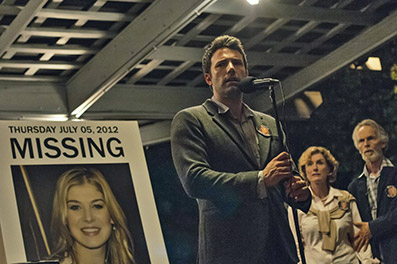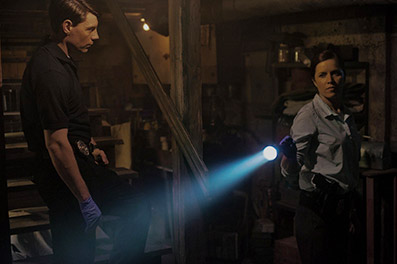"The thing in this story that I had never seen articulated before was this
idea that we create these narcissistic projections of ourselves in order to
get people to like us, and in some cases to seduce them. And yet we remain
completely oblivious that other people are doing the same thing to us." |
David Fincher Interview, The Telegraph, 2nd October 2014 |
I'm not so sure that we're completely oblivious to the fact that we are all projecting the very best snaring persona we can create. Whether we're trying to snare interest, fun, company, love, sex or money, aren't we projecting too, just to simply make our way? Yes, our 'performance' isn't always at the forefront of our thinking. As so-called civilised animals, we have locked doors to hide behind and mirrors into which to dress rehearse before we go public. We furnish ourselves with a courtesy awareness regarding other people's interaction with us (my pre-dentist appointment teeth cleaning ritual is so ludicrously detailed and long winded, it could be a Wilkie Collins novel). But whatever clothing we dress in, we are projecting something that, as with everything else, will be finally interpreted in the eye of the beholder - which is why advertising and generic TV deals in broad strokes. What can we possibly have to gain by projecting anything less than the best of what we believe us to be? (Jesus, how wonderfully aspirational, I should write self-motivation manuals). I don't know, how about authenticity, honesty, humanity, a connection? But what is the real you? It's a hard question to answer and a dumb one to ask in the first place. In Gone Girl, Amy says to her husband "The only time you liked yourself was when you were trying to be someone this (bad-c-word) might like..." That's the quote of the movie that you cannot, for obvious reasons, put on the poster.

We are what we think we need to be in every given situation in which we find ourselves. I was in what turned out to be a mild car accident on a motorway a few years ago but one with the potential for real nastiness. My friend slammed on the accelerator instead of the brake and we ploughed into the back of a BMW executive taxi, both cars doing over 60. I had to reassure my distraught friend, make sure it was safe to pull over, shove out an arm to make drivers in the slow lane open up for us and after we had mercifully come to a stop on the hard shoulder, take control of the situation, and most of that in about eight seconds. I shocked myself by being as calm as the Little Book Of. Ask me to retrieve the spare house key from inside the shed at night and I'm jelly waiting for a Neville Page alien creation to chitter behind me and strike. In the real world, isn't it about what you do rather than what you say or think? Or are those last two now more important than ever in our media drenched, socially networked world? Let's be frank. With very few exceptions, we all want to come across as attractive to other people. If nothing else, it's a genetic necessity. Some of my best friends would dispute that but even if they do (which they do), they have to concede that they are projecting a persona that they want others to accept - not necessarily like or admire - but accept. In my book, that's the same thing as wanting to be admired or loved. Same skin, different suit. "Hey, I'm projecting 'x'. Like it or lump it." Both, to my way of thinking, have the same endgame. So how do you cope when you realize you are in a relationship with someone whose actions grate against the semi-ideal and smart beauty you thought you'd married? Grate against? More like ‘obliterate'. Let's hear it for 'Amazing Amy'...
It's quite a professional threesome; director David Fincher, a personal favourite whose work is nearly always challenging and uncompromising despite the relatively modest success of his features (this one's already a bona fide hit); lead actor Ben Affleck, a real talent behind the camera (a double Oscar™ winning writer/producer to boot) but an actor somewhat trapped by his square jawed, all-American hero good looks. On US TV recently he squared up against The End Of Faith author, Sam Harris, and did not come off particularly well as he seemed to confuse an argument against bad ideas with racism. I blame his people misinforming him but what the hell do I know? Then there's the leading lady, Rosamund Pike, another actor somewhat strapped down (apt phrase given the narrative) by her beauty and a perception of cool, detached aloofness. This is why she was so perfect in Made In Dagenham. She represented a feminine ideal of which other women were fearful or resentful. In that movie, her confrontation with Sally Hawkins (an actor I absolutely adore because nothing she does on screen is dishonest) is a highlight that never fails to move me. So what could these three diverse individuals concoct to surprise us? The novel is a page-turner, no question, but it didn't linger, didn't stick. Months after reading it, I couldn't recall the climax and there are varying stories out and about that say Fincher's been terribly faithful except for a reworking of said climax. I suspect Fincher's take will be a little stickier than the book. Having seen the movie, ‘sticky' is a really unfortunate adjective. I still have that knife murder in Zodiac front and centre after a recent viewing – the camera angle Fincher uses to cover that is utterly demonic.

So Nick Dunne (Affleck) is in a trough of despondency in the recession but teaching a creative writing course. How do you actually do that, teach creativity? Isn't it like teaching someone how to recognise their Muse when it's vomiting rivers of liquid gold into their minds? "Write it down, write it down!" He returns to his home in Missouri on his fifth wedding anniversary and finds the glass coffee table smashed and signs of a struggle. His perfect wife is missing. Amy Dunne (Pike) is presented as one of those people (we all knew one or two in school, don't say you never noticed): attractive, sexy, confident, pro-active, aloof, and furtive and highly protective owners of one of the very few definitive manuals on human gullibility, media manipulation and credulousness. Here is a woman who was born to be reviled. The narrative is interwoven with flashbacks when Nick and Amy weren't so hogtied by circumstance and misfortune. As for any truth, emotional or otherwise, we'll just have to rely on Fincher's own reading of the original novel. Gillian Flynn, the author of the source material, has done a terrific job in writing a taut, teasing and warped screenplay and Fincher has translated it with a studied verve. There are no visible CG tricks (except for the mountain of After Effects work making it all look as if Adobe was just clay after all), no discernable artifice save the inherent deception in all movies that we expressly collude with the filmmaker in utterly ignoring. Gone Girl is the real deal, a thriller, a mystery, a police procedural, a drama and a relationship that passed crisis point months ago. And it's made with such a simple and robust style, one that belies the enormous and complex effort into making it look this slick. Trust me. It's worth the effort. If you've not read the book and really want to see the movie completely unspoiled, skip the next paragraph. I give away something that happens in the middle of the movie, something I don't deem too spoilery but hey, the warning's here if you want it. I'll paraphrase what's in it, without the spoiler - Rosamund Pike. Wow.
It's a small but necessary spoiler to say that Amy is the instigator of her own 'kidnap'. This must occur to reasonably clued-in audiences as a possible reason for Amy's mysterious disappearance. Halfway through the movie, it's revealed that she's planned her abduction down to the last drop of urine thereby giving a literal spin on the phrase 'taking the piss'. What follows is a battle of wits with all the elements in Amy's favour. As she set the rules of the game, this was to be expected. But one tiny unforeseen event (the perils of getting a hole in one in mini-golf) changes her fortunes and she suddenly has to come up with an alternative plan. I won't give anything else away. What I found extraordinary about this portion of the film is the commitment of the actor (we don't say actress any more, do we?) Pike gains pounds in her role as an abused runaway (channeling Charlize Theron in Monster) and sheds them later down the line. We're not talking a full on Jake LaMotta De Niro Raging Bull weight gain (surely it could not have been a digital effect…) but it still impresses how willing she was to dive head first in to the pool of Fincher's bidding. It's been reported that he asked her out to drink whiskey with him to see if she could deliver Amy as written. I'd like to think she Ravenwooded him under the table. For Pike, it's a dream of a part and she's brave to take it on. It'll certainly open her career choices up. She delivers big time. She's utterly convincing as Amy and as ‘Not Amy' and even watches the TV while her own photo is shown night after night and her new ‘friends' don't even note the resemblance. Maybe that's not so impressive. My partner donned a black wig in a fancy dress evening and it was truly hard to discern the girl I love without her own hair... My girl was gone...
Speaking of hair, plaudits must go to Affleck. I found his L'Oreal shampoo commercial (“Because he's worth it?”) utterly abhorrent and his choice of movies has not been completely to my taste (I'm sure he doesn't care about that) but his performance in this movie is a superb example of how to be an utterly convincing schlub. No, I didn't know what that word meant either. But it fits Affleck's Nick like a bespoke glove. Not too bright, lazy and all too willing to moan about how much fate has screwed him. We all play that card every now and again. Affleck doesn't flinch in making Nick unsympathetic in all sorts of ways. But in many regards Nick is us because if Amy is us then us are in a lot of trouble. Nick is just a guy who doesn't get what the media could do to him. In some ways (and please don't think I'm reading things into the movie that are not there), Gone Girl is the You Tube generation's L'Étranger, the real Camus's most famous novel. It is a man on trial for who he is rather than what he's done.
It's what she's done that's scarier… Gone Girl? We should be so lucky. |